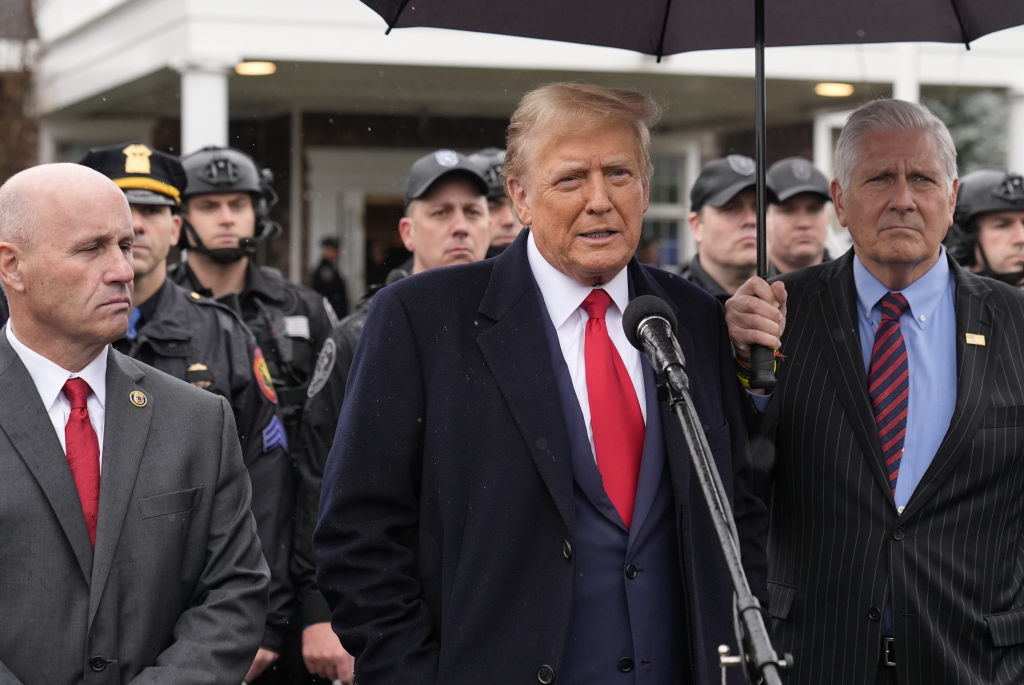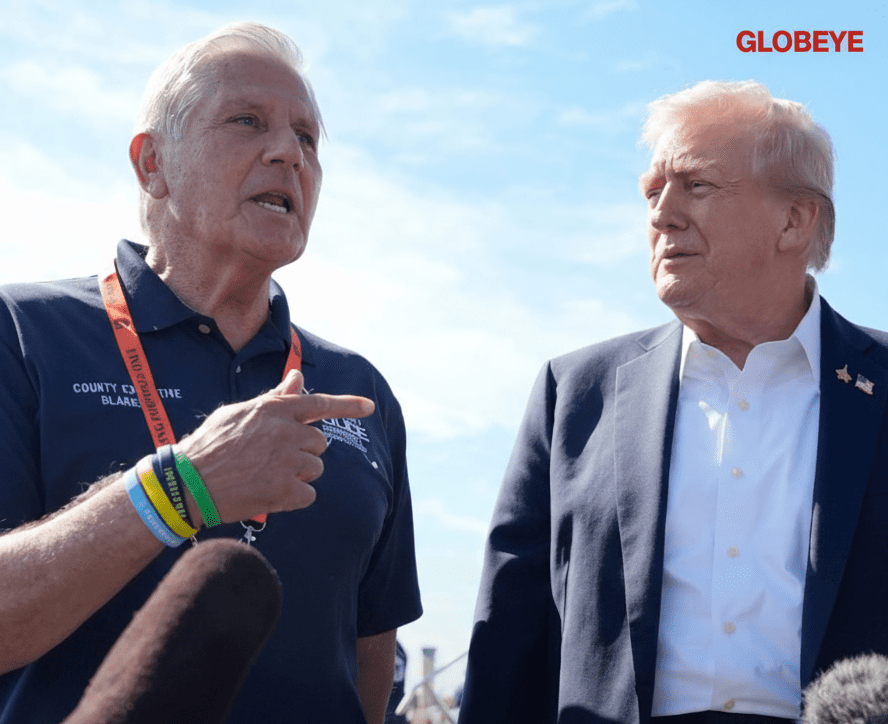Donald Trump Endorses Nassau County Executive Bruce Blakeman Just Before Election Day, Calling Him “100% MAGA” in a Move That Could Sway the Long Island Vote
On the final Sunday before Election Day, a local race on Long Island vaulted into the national conversation. Donald Trump, never shy about choosing a moment, stepped squarely into Nassau County politics and endorsed County Executive Bruce Blakeman for another term, calling him an “America First Patriot” and “100% MAGA.” The message landed on Truth Social with the unmistakable cadence of a campaign siren: Blakeman had his support, his confidence, and, as Trump put it, his complete and total endorsement. What happened next was predictable—and pivotal. A county-level contest suddenly felt like a referendum on the direction of suburban politics in the post-pandemic era.

Blakeman’s team moved quickly. In a race already framed by public safety, taxes, migration pressures, and cultural battles trickling down from national headlines, the endorsement became a centerpiece. Volunteers blasted it through text banks and neighborhood chats; the phrasing—“100% MAGA”—popped on yard signs, in fundraising emails, and in final-hour digital buys designed to push friendly voters over the line. If there was any doubt about which coalition Blakeman wanted energized in the closing stretch, there wasn’t now. He leaned into it, thanking Trump publicly and tying his record to the themes that have defined the former president’s brand: secure borders, strong police, lower taxes, and an unapologetic defense of suburban quality of life.
To understand why this mattered, you have to understand Nassau County. Home to more than a million residents, it sits just east of New York City and often reflects—sometimes anticipates—political shifts among suburban voters nationally. When Blakeman won in 2021, he did something Republicans hadn’t done since the late 1980s: he took the county executive’s office in a place that had long been considered tough terrain for the GOP. His campaign back then hammered local concerns that don’t always make national news but shape daily life—property tax pressure, school climate, bail and prosecution policy coming out of Albany, and whether residents felt safe on their commutes and in their neighborhoods. That formula worked once. The Trump endorsement suggests Blakeman believes it can work again, but with an added charge: harness the national energy of the conservative movement to drive turnout in a close local race.

The Democratic challenger this year, Legislator Seth Koslow, presents a clear contrast. A former prosecutor and criminal defense attorney, he has pitched himself as a pragmatic counterweight, arguing that Blakeman’s brand of politics turns county government into a stage for national culture wars. Koslow’s message is aimed at voters fatigued by polarization: scrutinize the budget, audit contracts, invest where services lag, and lower the temperature. He’s tried to pull the conversation back to nuts-and-bolts governing—parks, roads, affordability—while framing Blakeman as too aligned with Trump to meet the moment for a county that includes a large block of independents and party-switchers.
That push-and-pull—local competence versus national identity—has animated debates at kitchen tables from Great Neck to Massapequa. Older voters, police and fire families, and homeowners who rank public safety at the top of their list often credit the current administration’s posture toward law enforcement and border security as the right fit for the time. Younger renters, public-sector workers, and voters worried about affordability argue the county needs more transparency and less showmanship. The Trump endorsement didn’t create those divides; it clarified them.

If you listen to Blakeman’s allies, they’ll tell you this is exactly the moment to make the choice obvious. They point to a record they say lines up with promises: holding the line on county taxes in a high-inflation era, recruiting and promoting hundreds of officers to keep Nassau among the safest counties in America, and pushing back on state-level directives they argue undermine local control. They also note the county’s bond upgrades in recent years and boast that business confidence has held steady through national volatility. Put simply, their argument is that the numbers match the narrative: fiscally steadier, visibly safer, and more responsive to suburban families who felt sidelined during the most turbulent years of the decade.
Koslow’s camp pushes back hard on the same terrain. They argue that public safety is a shared priority but that the current administration has leaned too far into rhetoric, over-crediting itself for trends that also reflect regional and national patterns. On finances, they say the county can’t afford a victory lap until residents feel relief in their property tax bills and small businesses see faster permitting and fewer bureaucratic snags. And on tone, they argue that tying county government so closely to Trump might energize one side but risks alienating moderates who want less drama and more day-to-day problem solving.
All of which makes Trump’s timing more than just a headline. In Nassau County, turnout is king. Off-year and odd-year elections can tip on a few thousand votes driven by intensity rather than persuasion. A late, loud endorsement from the most galvanizing figure in Republican politics is not a subtle play; it’s a turnout accelerant. It says to Blakeman’s natural base—law-and-order voters, small-business owners, longtime homeowners—that this isn’t just a county executive’s race. It’s a front in a bigger fight over where suburban New York goes next.

Of course, endorsements like this cut both ways. The same message that electrifies Republicans can animate Democrats and independents who want to put distance between local governance and national spectacle. Campaigns in Nassau know this; that’s why Koslow has already framed the endorsement as confirmation, not revelation. In his telling, the race was always about whether residents want a county executive whose compass points to Mar-a-Lago or a manager who answers only to Mineola. In the closing hours, expect his supporters to lean hard on that theme, calling neighbors who haven’t voted yet with a simple question: do you want more national politics in your local government?
Strip away the slogans and the two-man argument settles into a few core issues that decide most Nassau races. First, safety. Blakeman’s administration has prioritized police staffing and high-visibility enforcement, and he’s been a persistent critic of New York’s bail-reform framework. Koslow says enforcement and reform aren’t mutually exclusive and that the county’s approach must match data, not just instincts. Second, taxes and cost of living. Republicans say they’ve kept a lid on county taxes and pushed discipline through the budget; Democrats say residents don’t feel enough relief and worry that services are strained. Third, immigration and migration pressures. The county’s posture on shelter placements, cooperation with federal authorities, and the knock-on effects of city policy are never far from the surface, and they track closely with national debates that Trump dominates.

What makes this moment feel larger than a standard county race is the way Long Island has been trending. Over the past few cycles, the region has become a proving ground for an assertive, security-first flavor of Republicanism—one that pairs fiscal caution with cultural clarity. Wins in county and congressional contests have encouraged the party to double down; losses have usually turned on candidate quality or turnout, not ideology. Trump’s endorsement places Nassau squarely in that arc. If Blakeman wins with the former president at his back, Republicans will say the model travels. If he loses, Democrats will argue that the suburbs have heard enough from Mar-a-Lago and want a reset.
Blakeman himself is no stranger to the long game. His career in Nassau politics stretches back decades—from the county legislature to the Port Authority and local town government—before his 2021 win vaulted him back into executive office. That arc gives him a built-in story about experience and steadiness, something his supporters say matters when budgets are tight and every decision has a household impact. Koslow, by contrast, offers freshness and a prosecutorial lens, pitching himself as the watchdog for residents who think county hall has grown too comfortable.
The choice, then, is not abstract. It’s about how residents feel when they drive to work before dawn, when they pay the property-tax bill, when they walk their kids to the bus stop, and when they call 911 and expect seconds to matter. It’s about how a county positions itself amid a city’s struggles next door and a state’s policies from above. Trump’s endorsement may be the spark, but the fuel is local: do voters believe their county is safer, more affordable, and better run than it was four years ago, and which candidate makes that more likely tomorrow?

By Monday morning, phones in campaign headquarters across Nassau were lighting up with the same data points that decide everything: who voted early, who needs a ride to the polls, which precincts are behind pace, where the last-minute messaging should land. Outside, the mailers with “100% MAGA” sat in piles on kitchen counters; the counter-messages about stability and moderation lined up beside them. Yard signs fluttered in a cold breeze that felt, depending on your politics, either like a tailwind or a warning.
There’s one more reason this endorsement matters. It tests whether suburban voters who once split their ticket—law-and-order Republican locally, Democrat federally—still exist in numbers big enough to swing a race. If the answer is yes, both parties will recalibrate heading into the next statewide cycle. If the answer is no, and the county aligns cleanly with one party’s national identity, Nassau may become a bellwether of something bigger: a suburban realignment that started years ago and is now settling into place.
As for Trump, the message he intended to send was simple. He hasn’t ceded the suburbs and he hasn’t lost interest in the ground game. He still chooses his moments, and he still knows how to dominate a news cycle with a single sentence. For Bruce Blakeman, that sentence is now a banner—one he’s decided to carry into Election Day. For Seth Koslow, it’s a challenge—one he hopes will rally the voters who want their county politics to feel small again. For everyone else in Nassau County, it’s a decision. And by Tuesday night, it will be a result.


